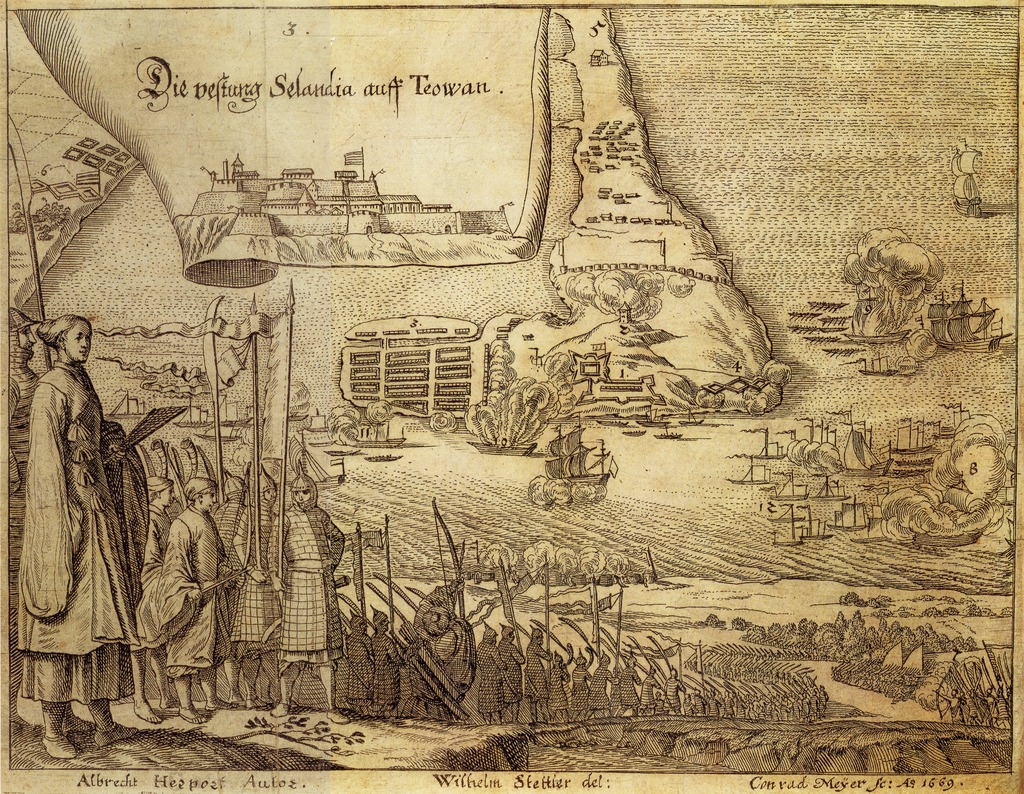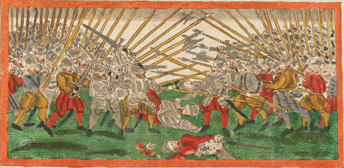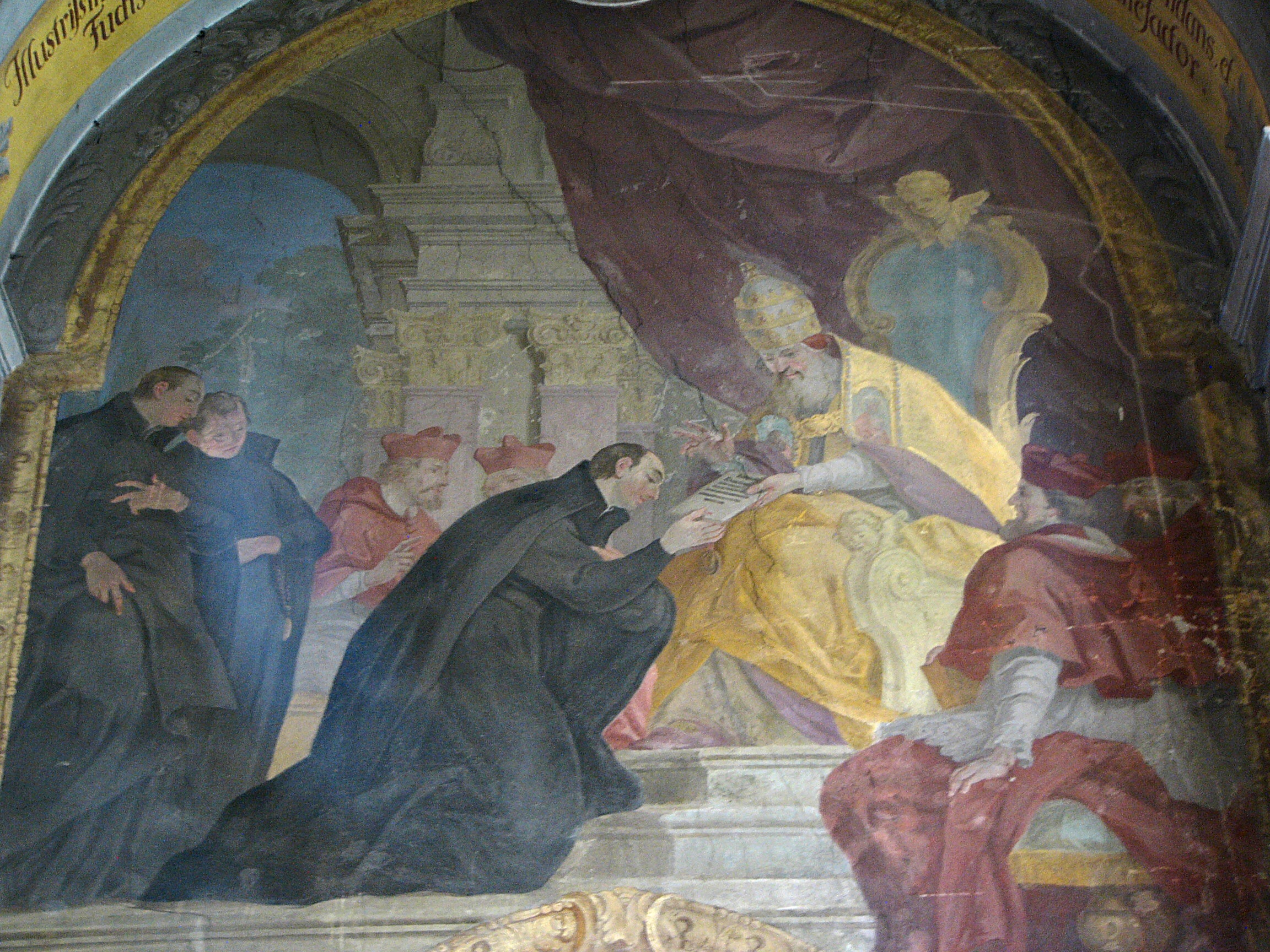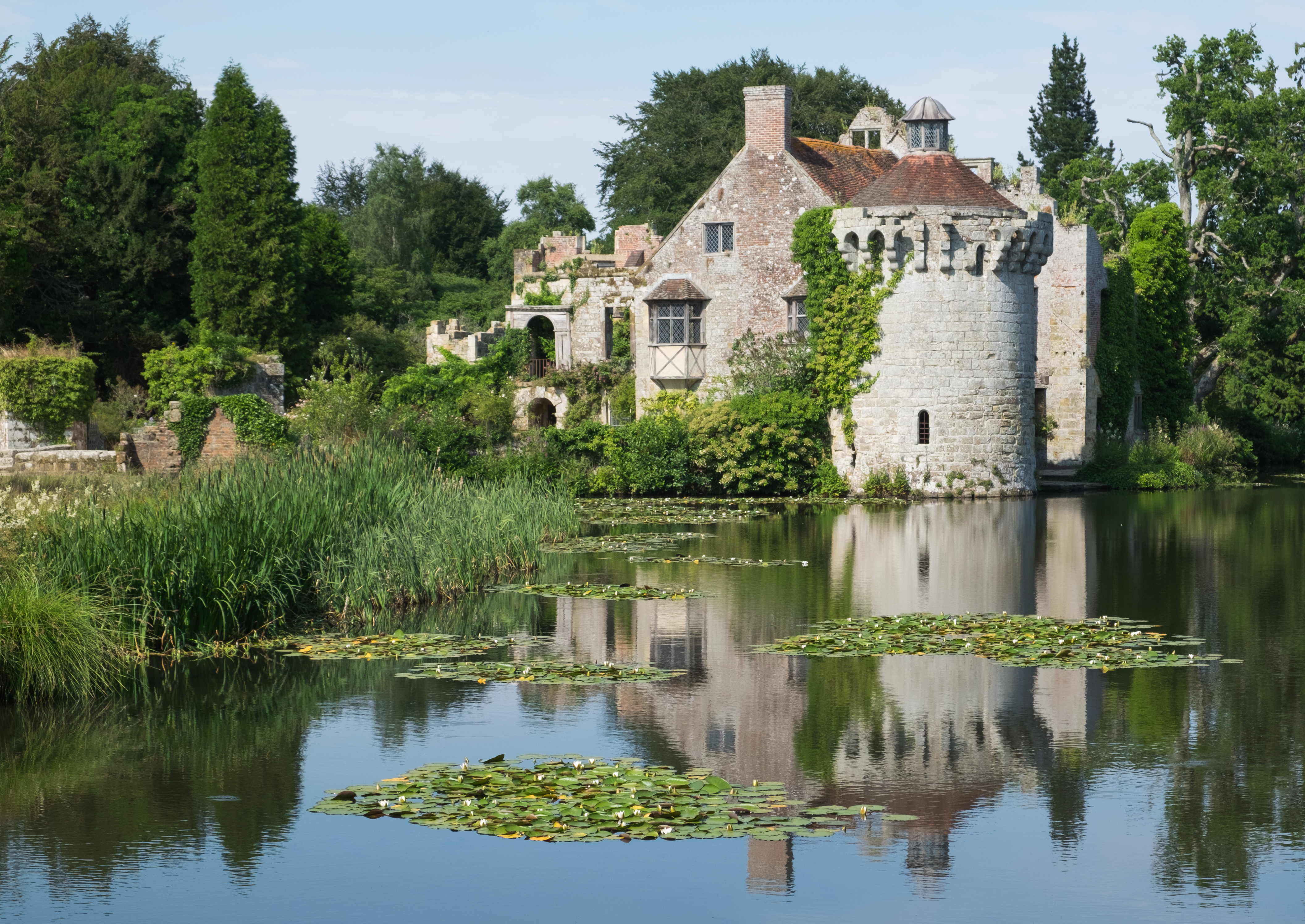|
Henry More (Jesuit)
Henry More (1586–1661) was an English Jesuit provincial and church historian. Biography Henry More was the son of Edward More, and great-grandson of Thomas More, lord chancellor of England. He was born in 1586 in Essex, according to the majority of the provincial catalogues, though a few of them give Cambridgeshire as the county of his birth. More made his humanity studies in the college of the English Jesuits at St. Omer, and entered the novitiate of St. John's, Louvain, 19 November 1607. His higher studies were probably made in Spain. In 1614, More filled the office of minister in the English college of St. Alban at Valladolid; he held the same office in the college at St. Omer in 1621; and he was professed of the four vows on 12 May 1622. From 1622 until 1632, he was a missioner in the London district. More was one of the Jesuits arrested at the Clerkenwell residence by the officers of the privy council in March 1628. In 1632, he was in confinement in the New Prison, Lo ... [...More Info...] [...Related Items...] OR: [Wikipedia] [Google] [Baidu] |
Jesuit
The Society of Jesus (; abbreviation: S.J. or SJ), also known as the Jesuit Order or the Jesuits ( ; ), is a religious order (Catholic), religious order of clerics regular of pontifical right for men in the Catholic Church headquartered in Rome. It was founded in 1540 by Ignatius of Loyola and six companions, with the approval of Pope Paul III. The Society of Jesus is the largest religious order in the Catholic Church and has played significant role in education, charity, humanitarian acts and global policies. The Society of Jesus is engaged in evangelization and apostolic ministry in 112 countries. Jesuits work in education, research, and cultural pursuits. They also conduct retreats, minister in hospitals and parishes, sponsor direct social and humanitarian works, and promote Ecumenism, ecumenical dialogue. The Society of Jesus is consecrated under the patron saint, patronage of Madonna della Strada, a title of the Blessed Virgin Mary, and it is led by a Superior General of ... [...More Info...] [...Related Items...] OR: [Wikipedia] [Google] [Baidu] |
Matthew Wilson (Jesuit)
Edward Knott, real name Matthew Wilson (1582–1656) was an English Jesuit controversialist, twice provincial of the Society of Jesus in England. Life He was born at Catchburn in the parish of Morpeth, Northumberland, Morpeth, Northumberland, After studying humanities in the college of the English Jesuits at St. Omer. he was on 10 October 1602 admitted an alumnus of the English College at Rome, under the assumed same of Edward Knott, which he retained through life. He was ordained priest on 27 March 1606. He entered the Society of Jesus on 2 October the same year, and upon the expiration of his novitiate in 1608 he was appointed penitentiary in Rome. For some time he was prefect of studies in the English College. He was raised to the rank of a professed father of the Society of Jesus on 30 September 1618. During 1626 he was a missioner in the Suffolk district. He was apprehended in 1629, and was committed to the Clink prison in Southwark, but at the instance of queen Henrietta ... [...More Info...] [...Related Items...] OR: [Wikipedia] [Google] [Baidu] |
17th-century English Jesuits
The 17th century lasted from January 1, 1601 (represented by the Roman numerals MDCI), to December 31, 1700 (MDCC). It falls into the early modern period of Europe and in that continent (whose impact on the world was increasing) was characterized by the Baroque cultural movement, the latter part of the Spanish Golden Age, the Dutch Golden Age, the French ''Grand Siècle'' dominated by Louis XIV, the Scientific Revolution, the world's first public company and megacorporation known as the Dutch East India Company, and according to some historians, the General Crisis. From the mid-17th century, European politics were increasingly dominated by the Kingdom of France of Louis XIV, where royal power was solidified domestically in the civil war of the Fronde. The semi-feudal territorial French nobility was weakened and subjugated to the power of an absolute monarchy through the reinvention of the Palace of Versailles from a hunting lodge to a gilded prison, in which a greatly expanded r ... [...More Info...] [...Related Items...] OR: [Wikipedia] [Google] [Baidu] |
1661 Deaths
Events January–March * January 6 – The Fifth Monarchists, led by Thomas Venner, unsuccessfully attempt to seize control of London; George Monck's regiment defeats them. * January 29 – The Rokeby baronets, a British nobility title is created. * January 30 – The body of Oliver Cromwell is exhumed and subjected to a posthumous execution in London, along with those of John Bradshaw and Henry Ireton. * February 5 – The Shunzhi Emperor of the Chinese Qing Dynasty dies, and is succeeded by his 7-year-old son the Kangxi Emperor. * February 7 – Shah Shuja, who was deprived of his claim to the throne of the Mughal Empire by his younger brother Aurangzeb, then fled to Burma, is killed by Indian troops in an attack on his residence at Arakan. * February 14 – George Monck’s regiment becomes ''The Lord General's Regiment of Foot Guards'' in England (which later becomes the Coldstream Guards). * March 9 – Following the death o ... [...More Info...] [...Related Items...] OR: [Wikipedia] [Google] [Baidu] |
1586 Births
Events January – March * January 3 – Augustus of Wettin, the Elector of Saxony, marries Agnes Hedwig of Anhalt, the 12-year-old daughter of Joachim Ernest, Prince of Anhalt. Augustus dies less than six weeks later. * January 18 – The 7.9 magnitude Tenshō earthquake strikes the Chubu region of Japan, triggering a tsunami and causing at least 8,000 deaths. * February 11 **After a two-day battle, an English assault force led by Francis Drake captures the South American port of Cartagena de Indias, part of Spain's colony, the Viceroyalty of Peru (now Cartagena in Colombia. **In Dresden, Christian I becomes the new Elector of Saxony, after the death of his father Augustus. * February 14 – In India, Yakub Shah Chak becomes the new Sultan of Kashmir after the death of his father, the Sultan Yousuf Shah. * February 16 – In what is now Buner District, Pakistan, Kalu Khan leads his Yousafzai-Afghan Lashkar to defeat the Mughal Army at the Karak ... [...More Info...] [...Related Items...] OR: [Wikipedia] [Google] [Baidu] |
Edward Knott
Edward Knott, real name Matthew Wilson (1582–1656) was an English Jesuit controversialist, twice provincial of the Society of Jesus in England. Life He was born at Catchburn in the parish of Morpeth, Northumberland, After studying humanities in the college of the English Jesuits at St. Omer. he was on 10 October 1602 admitted an alumnus of the English College at Rome, under the assumed same of Edward Knott, which he retained through life. He was ordained priest on 27 March 1606. He entered the Society of Jesus on 2 October the same year, and upon the expiration of his novitiate in 1608 he was appointed penitentiary in Rome. For some time he was prefect of studies in the English College. He was raised to the rank of a professed father of the Society of Jesus on 30 September 1618. During 1626 he was a missioner in the Suffolk district. He was apprehended in 1629, and was committed to the Clink prison in Southwark, but at the instance of queen Henrietta Maria's mother, Mar ... [...More Info...] [...Related Items...] OR: [Wikipedia] [Google] [Baidu] |
Society Of Jesus
The Society of Jesus (; abbreviation: S.J. or SJ), also known as the Jesuit Order or the Jesuits ( ; ), is a religious order of clerics regular of pontifical right for men in the Catholic Church headquartered in Rome. It was founded in 1540 by Ignatius of Loyola and six companions, with the approval of Pope Paul III. The Society of Jesus is the largest religious order in the Catholic Church and has played significant role in education, charity, humanitarian acts and global policies. The Society of Jesus is engaged in evangelization and apostolic ministry in 112 countries. Jesuits work in education, research, and cultural pursuits. They also conduct retreats, minister in hospitals and parishes, sponsor direct social and humanitarian works, and promote ecumenical dialogue. The Society of Jesus is consecrated under the patronage of Madonna della Strada, a title of the Blessed Virgin Mary, and it is led by a superior general. The headquarters of the society, its general ... [...More Info...] [...Related Items...] OR: [Wikipedia] [Google] [Baidu] |
Provincial Superior
A provincial superior is an officer of a religious institute (including religious orders) acting under the institute's Superior General. A provincial superior exercises general supervision over all the members of that institute in a territorial division of the order called a ''province'', which is similar to, but not to be confused with, an ecclesiastical province. Instead, the province under a provincial superior is one made up of particular churches or dioceses under the supervision of a Metropolitan Bishop. The division of a religious institute into provinces is generally along geographical lines and may consist of one or more countries, or of only a part of a country. There may be, however, one or more houses of one province situated within the physical territory of another since the jurisdiction over the individual religious is personal, rather than territorial. The title of the office is often abbreviated to Provincial. Among the friars and Third Order Religious Sister ... [...More Info...] [...Related Items...] OR: [Wikipedia] [Google] [Baidu] |
Richard Blount (priest)
Richard Blount, S.J. (1565–1638) was an English priest and the first Jesuit Provincial of England after the Elizabethan Laws were passed. Biography Early life Richard was born into the Leicestershire branch of the Blount Family in 1565. He attended school at Balliol College, Oxford. Afterward he went to Trinity for his university studies, but left shortly after arriving having converted to Catholicism. He travelled to the English College at Douai in the Spanish Netherlands, arriving on 22 July 1583. The college was temporarily in Rheims due to ongoing conflict in Douai. In 1584 he continued on to the English College, Rome. Priesthood After five years at the English College in Rome, Blount was ordained a priest in 1589. He worked with Father Robert Parsons, S.J. to smuggle himself back into England in 1591 posing as returning sailor prisoners-of-war from the failed expedition against Spain by the Earl of Essex. He was taken before the Lord High Admiral Howard of Effingham ... [...More Info...] [...Related Items...] OR: [Wikipedia] [Google] [Baidu] |
Watten, Nord
Watten (; , meaning " ford" as in "river-crossing") is a commune in the Nord department in northern France. Its inhabitants are called "Wattenais". History In the 10th century the region around Watten belonged to the Abbey of Saint-Riquier though the counts of Boulogne and Flanders attempted to take possession of it. The abbey of Watten was the oldest foundation of regular canons in the dioceses of Therouanne. While on the way to the Holy Land during the First Crusade, count Robert II of Flanders received several relics from the duke of Apulia, Roger Borsa, including a hair of the Virgin as well as some bones of St Matthew and St Nicholas. Robert II sent them back to his wife Clemence who had them installed in the abbey of Watten in October 1097. In 1099, pope Urban II granted the regular canons of the Abbey privileges. Geography Watten is located at the limit of the French Flanders historical county. However, the local Dutch dialect (French Flemish) is virtually extinct. ... [...More Info...] [...Related Items...] OR: [Wikipedia] [Google] [Baidu] |
College Of St
A college (Latin: ''collegium'') may be a tertiary educational institution (sometimes awarding degrees), part of a collegiate university, an institution offering vocational education, a further education institution, or a secondary school. In most of the world, a college may be a high school or secondary school, a college of further education, a training institution that awards trade qualifications, a higher-education provider that does not have university status (often without its own degree-awarding powers), or a constituent part of a university. In the United States, a college may offer undergraduate programs – either as an independent institution or as the undergraduate program of a university – or it may be a residential college of a university or a community college, referring to (primarily public) higher education institutions that aim to provide affordable and accessible education, usually limited to two-year associate degrees. The word "college" is generally ... [...More Info...] [...Related Items...] OR: [Wikipedia] [Google] [Baidu] |
Rector (ecclesiastical)
A rector is, in an ecclesiastical sense, a cleric who functions as an administrative leader in some Christian denominations. In contrast, a vicar is also a cleric but functions as an assistant and representative of an administrative leader. Ancient usage In ancient times bishops, as rulers of cities and provinces, especially in the Papal States, were called rectors, as were administrators of the patrimony of the Church (e.g. '). The Latin term ' was used by Pope Gregory I in '' Regula Pastoralis'' as equivalent to the Latin term ' (shepherd). Roman Catholic Church In the Roman Catholic Church, a rector is a person who holds the ''office'' of presiding over an ecclesiastical institution. The institution may be a particular building—such as a church (called his rectory church) or shrine—or it may be an organization, such as a parish, a mission or quasi-parish, a seminary or house of studies, a university, a hospital, or a community of clerics or religious. ... [...More Info...] [...Related Items...] OR: [Wikipedia] [Google] [Baidu] |





